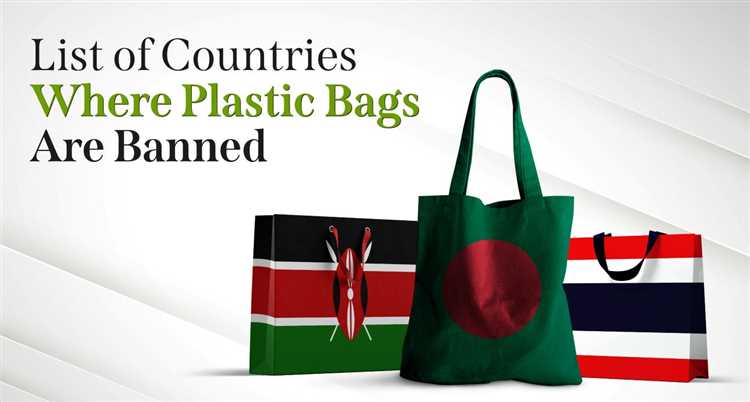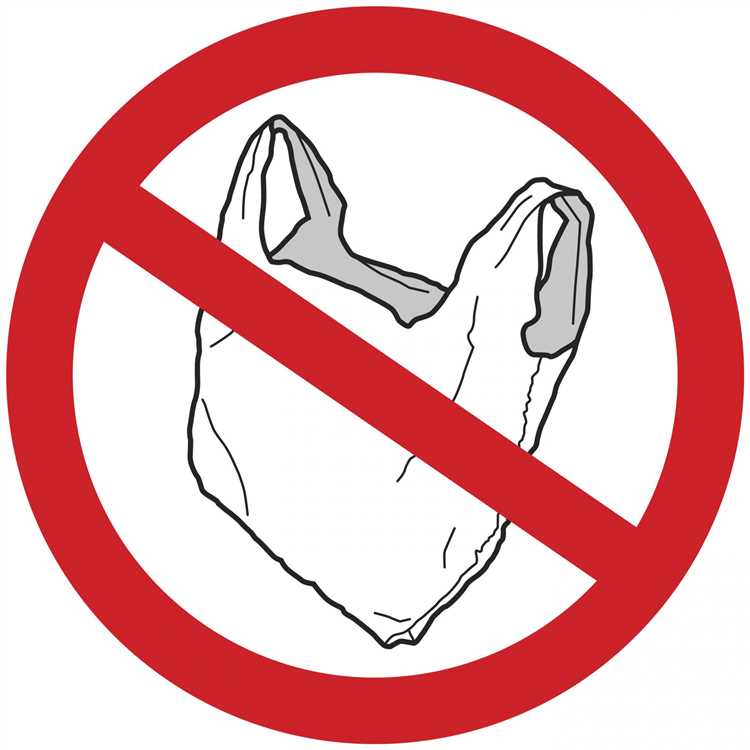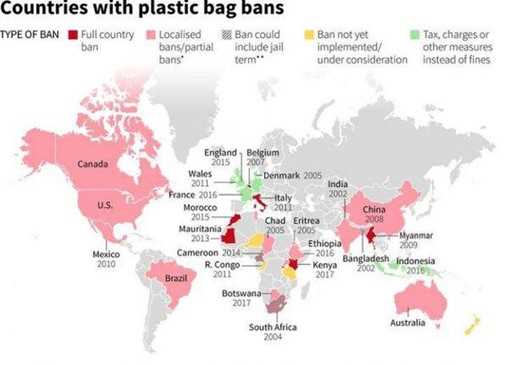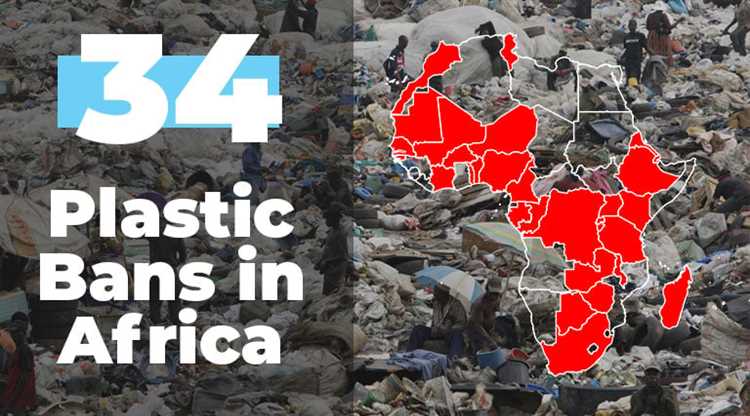
Plastic bags have become a major environmental concern worldwide due to their negative impact on ecosystems and wildlife. Many countries and cities have taken steps to reduce plastic waste, including banning or implementing restrictions on the use of plastic bags. One country, in particular, has gone above and beyond by completely banning all plastic bags.
This forward-thinking country is none other than Rwanda. In 2008, Rwanda implemented one of the strictest plastic bag bans in the world, making it illegal to produce, import, use, or sell plastic bags. The ban applies to both single-use and non-biodegradable plastic bags, with severe penalties for violators, including fines and imprisonment.
Rwanda’s decision to ban plastic bags was driven by the desire to protect its natural environment and promote sustainable development. The country had experienced numerous issues with plastic bag pollution, including blocked drainage systems and littered landscapes. By implementing the ban, Rwanda has been able to significantly reduce plastic waste and create a cleaner and healthier environment for its citizens.
Since the ban was put into place, Rwanda has become a model for other nations looking to tackle the issue of plastic waste. The country has seen a substantial decrease in plastic bag usage, with alternatives such as paper bags and reusable cloth bags becoming more popular. Rwanda’s success in banning plastic bags serves as an inspiration for other countries to take similar steps and work towards a more sustainable future.
- Overview of plastic bag pollution
- Environmental Impact
- Social and Economic Consequences
- Efforts to Address Plastic Bag Pollution
- Environmental impact of plastic bags
- 1. Pollution
- 2. Landfill waste
- 3. Microplastic pollution
- Which country banned all plastic bags?
- Reasons behind the ban
- Economic factors
- Public awareness and support
- Implementation and results of the ban
- Q&A:
- Which country banned all plastic bags?
- When did Rwanda ban all plastic bags?
- Why did Rwanda ban all plastic bags?
- How did Rwanda enforce the ban on plastic bags?
- What alternatives to plastic bags are available in Rwanda?
- Which country banned all plastic bags?
Overview of plastic bag pollution

Plastic bag pollution is a significant environmental issue that affects our planet’s ecosystems and human health. The excessive use of plastic bags has led to a global crisis, with millions of bags ending up in landfills and oceans each year.
Environmental Impact
The environmental impact of plastic bag pollution is severe. Plastic bags are not biodegradable and can take hundreds of years to break down. As a result, they accumulate in the environment, posing a threat to wildlife and marine ecosystems. Marine animals often mistake plastic bags for food, leading to internal injuries and death. Additionally, plastic bags pollute water sources and soil, harming plants and disrupting ecological balance.
Social and Economic Consequences
Plastic bag pollution also has social and economic consequences. The production and disposal of plastic bags require vast amounts of resources and energy, contributing to carbon emissions and climate change. Moreover, the cleanup of plastic bag litter and the management of waste cost governments and communities significant sums of money.
The reliance on plastic bags also hinders the development of sustainable alternatives. By promoting a throwaway culture, plastic bags discourage the use of reusable or biodegradable bags, further exacerbating the pollution problem.
Efforts to Address Plastic Bag Pollution
To combat plastic bag pollution, many countries and cities around the world have implemented various measures, including bans and taxes on single-use plastic bags. These actions aim to reduce the consumption of plastic bags and encourage the adoption of more sustainable alternatives.
One notable example is the country that banned all plastic bags, which has effectively reduced plastic bag pollution and prompted individuals and businesses to seek alternative options. By implementing strict regulations and promoting awareness about the harmful effects of plastic bags, this country has set a precedent for environmental conservation.
Furthermore, individuals can contribute to reducing plastic bag pollution by adopting simple yet impactful habits, such as using reusable bags, recycling plastic bags, and supporting businesses that prioritize sustainability.
By addressing plastic bag pollution through collective efforts, we can protect our environment and create a sustainable future for generations to come.
Environmental impact of plastic bags
Plastic bags have become a major concern due to their negative impact on the environment. They are made from non-renewable resources such as crude oil, which contributes to carbon emissions and climate change. Additionally, the production of plastic bags requires a significant amount of energy and water, further depleting natural resources.
1. Pollution
Plastic bags are known for their ability to persist in the environment for hundreds of years, contributing to pollution in various ecosystems. When not properly disposed of, they can end up in water bodies, where they pose a threat to marine life. Many marine animals mistake plastic bags for food and often die as a result of ingestion or entanglement.
2. Landfill waste
As plastic bags are not biodegradable, they accumulate in landfills, taking up valuable space and contributing to the growing waste problem. These bags can take hundreds of years to break down, releasing harmful chemicals into the soil and water during the decomposition process.
Furthermore, the lightweight nature of plastic bags makes them prone to being carried by wind currents, resulting in litter in urban areas and natural landscapes. This not only creates an unsightly environment but also poses a risk to wildlife that may become entangled or suffocate due to plastic bag debris.
3. Microplastic pollution

Over time, plastic bags break down into smaller pieces known as microplastics, which can be easily mistaken for food by animals. These microplastics can also enter the food chain and ultimately have detrimental effects on human health. They have been found in the bodies of various species, including fish, birds, and even humans.
Due to these environmental concerns, many countries have taken steps to reduce the usage of plastic bags or ban them entirely. By implementing alternative solutions such as reusable bags or biodegradable alternatives, we can minimize the negative impacts of plastic bags and work towards a more sustainable future.
Which country banned all plastic bags?
Many countries around the world have implemented restrictions or bans on the use of plastic bags, but one country stands out as having banned all plastic bags completely. That country is Rwanda.
Rwanda, a small country in East Africa, implemented a nationwide ban on plastic bags in 2008. This was a groundbreaking move that aimed to reduce environmental pollution and promote sustainable practices.
The ban in Rwanda was comprehensive, prohibiting the production, importation, sale, and use of plastic bags. This means that anyone caught with plastic bags in the country could face hefty fines or even imprisonment.
Instead of using plastic bags, Rwanda encourages its citizens to use reusable bags made of fabric or other eco-friendly materials. The government has also invested in public awareness campaigns and education programs to promote responsible waste management and reduce plastic pollution.
The ban on plastic bags in Rwanda has had a significant impact on the country’s environment. It has helped reduce litter, particularly in urban areas, and has prevented plastic bags from clogging drains and causing flooding during the rainy season.
Rwanda’s success in banning plastic bags has inspired other countries to take similar actions. Several African nations, including Kenya and Tanzania, have followed suit and implemented their own bans on plastic bags.
Overall, Rwanda’s ban on plastic bags serves as an example of how proactive measures can be taken to protect the environment and promote sustainable practices. It highlights the importance of reducing plastic waste and finding alternative solutions for packaging and carrying goods.
Reasons behind the ban
There are several compelling reasons behind the decision to ban all plastic bags in this country. One of the main reasons is the detrimental impact that plastic bags have on the environment. These bags are not biodegradable and can take hundreds of years to break down, leading to long-term pollution and littering of land and water bodies. The abundance of plastic bags also poses a significant threat to wildlife, as animals often mistake them for food or become entangled in them.
Moreover, the production of plastic bags requires a significant amount of resources, including fossil fuels, water, and electricity. By eliminating plastic bags, the country aims to reduce its carbon footprint and conserve valuable resources. The ban also encourages the use of more sustainable alternatives, such as reusable bags made from natural materials like cotton or jute.
Economic factors

In addition to environmental concerns, there are also economic factors that drove the ban on plastic bags. The country realized that the cost of managing and disposing of plastic bags was becoming an increasing burden on local governments and communities. The expenses associated with collecting and processing plastic waste, as well as the negative impact on tourism due to littered beaches and landscapes, prompted the decision-makers to take action.
Furthermore, the ban presents an opportunity for local businesses to innovate and create alternative packaging solutions. This not only promotes economic growth but also fosters a sense of responsibility towards the environment. Many consumers also appreciate the shift towards more sustainable packaging options, which can ultimately contribute to increased sales for businesses.
Public awareness and support
Public awareness and support played a crucial role in the decision to ban plastic bags. As citizens became more educated about the detrimental effects of plastic bags on the environment, there was a growing demand for change. Environmental activists and organizations conducted campaigns and initiatives to raise awareness and gather public support. Through petitions, social media advocacy, and conversations with elected officials, citizens voiced their concerns and pushed for the ban.
The ban on plastic bags reflects a collective effort to protect the environment, conserve resources, and build a more sustainable future. It serves as a powerful example of how public awareness and support can drive positive change and lead to a cleaner and greener country.
Implementation and results of the ban
After the country decided to implement the ban on plastic bags, several measures were put in place to ensure its successful implementation. First, a public awareness campaign was launched to educate the population about the environmental impact of plastic bags and the need for the ban. This campaign utilized various media channels, including television, radio, and social media, to reach a wide audience.
Additionally, the government worked closely with retailers to provide alternative options to plastic bags. Many stores started offering reusable bags made from eco-friendly materials, such as cotton or jute, for purchase. This not only helped in reducing plastic bag usage but also created a new market for sustainable products.
To enforce the ban, strict penalties were put in place for individuals and businesses found in violation. Inspections were conducted regularly to ensure compliance, and fines were imposed on those who failed to abide by the ban. These penalties played a crucial role in deterring the use of plastic bags and encouraging the adoption of more sustainable alternatives.
The results of the ban have been promising. Within the first year of its implementation, the country witnessed a significant decrease in plastic bag consumption. The ban had a positive impact on the environment, with a noticeable reduction in plastic waste and litter. The banning of plastic bags also led to the growth of the reusable bag industry, creating job opportunities and boosting the economy.
| Benefits of the ban | Challenges faced |
|---|---|
| The reduction in plastic waste | Resistance from certain sectors |
| Promotion of sustainable alternatives | Transition period for retailers |
| Creation of a green economy | Initial cost of implementing the ban |
In conclusion, the ban on plastic bags was successfully implemented in the country, resulting in a significant decrease in plastic bag consumption and a positive impact on the environment. While there were challenges faced during the implementation process, the overall results have been beneficial, promoting a greener and more sustainable future.
Q&A:
Which country banned all plastic bags?
Rwanda is the country that banned all plastic bags.
When did Rwanda ban all plastic bags?
Rwanda banned all plastic bags in 2008.
Why did Rwanda ban all plastic bags?
Rwanda banned all plastic bags to protect the environment and prevent pollution.
How did Rwanda enforce the ban on plastic bags?
Rwanda enforced the ban on plastic bags by implementing strict penalties and conducting regular inspections.
What alternatives to plastic bags are available in Rwanda?
In Rwanda, alternatives to plastic bags include paper bags, fabric bags, and bio-degradable bags.
Which country banned all plastic bags?
Rwanda is the country that banned all plastic bags.